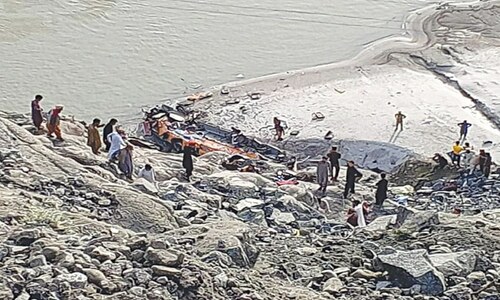KARACHI, May 20: The mysterious but rapidly spreading movement — at least in the form of graffiti, billboards and demonstrations — for the creation of a separate province for ‘Muhajirs’ by dividing Sindh has created a huge dilemma for the Urdu-speakers’ biggest representative party, the Muttahida Qaumi Movement (MQM).
Officially the MQM remains committed to the unity of Sindh, but many of its senior members have started to admit that the top leadership is coming under immense pressure from the lower cadre and other sections of the ‘muhajir’ community on the issue. The growing pressure is either for solving their problems, or for agreeing with the idea of a separate province to be carved out of Sindh. The last few months have seen an unexplained, albeit mysterious, political development in Karachi, and partly in Hyderabad, where a hitherto unknown organisation has started a campaign for the creation of a separate province. It began with some wall chalking (graffiti) on the main thoroughfares for a ‘muhajir suba’. Except for some Sindhi nationalists, most people in Karachi ignored such graffiti. The theory that the Muttahida may have been behind the campaign subsided when the issue was raised in the Sindh assembly and the MQM openly supported a resolution against the division of Sindh and supported the call for the unity of the province. However, most Sindhi nationalists remained suspicious of this silent movement, and a few even described it as a well-planned move.
Since the Sindh government condemned the campaign for the division of Sindh and ordered removal of graffiti about ‘muhajir suba’ some of the wall chalking was erased by the authorities. However, many officials admitted that the wall chalking was so widespread that it might take them weeks, if not months, to remove all of it. And then there was no guarantee that it will not reappear in the areas dominated by the Urdu-speaking community.
Interestingly, the last weeks have given a completely new dimension to this apparently leaderless campaign for the division of Sindh. Like the leadership of this mysterious ‘tehreek (movement)’, the contours of this so-called province also remain unknown. Whether they are asking for Karachi to be turned into a separate province, or would like Hyderabad and the area in between the two cities to be part of this so-called ‘muhajir suba’ is not clear.
However, the speed with which the walls of Karachi have been painted with demands for a ‘muhajir suba’, the manner in which well-designed billboards have started to appear on the main roads of the city, and the way big and small demonstrations and rallies have started to come out in Korangi and other ‘muhajir’-dominated areas, has given rise to a feeling that even if the MQM is not orchestrating this campaign, it is certainly not willing to quell it. Though still quite vocal in their statements about the unity of Sindh, and for a lasting relationship between the native Sindhis and Urdu-speaking ‘new Sindhis’ or ‘muhajirs’, many senior MQM leaders are of the view that frustrations found among many residents of Karachi cannot be ignored outright.
Senior MQM leader, Raza Haroon, maintained during a TV talk show that the party’s position was abundantly clear about the unity of the province. He even went to the extent of saying that merely through ‘wall chalking’ a new province cannot be created. However, he too claimed that the pressure about the failure to fulfil the demands of the people of Karachi was so intense that it was difficult to ignore such feelings.
A more elaborate policy statement came from Dr Farooq Sattar, who is the deputy convener of MQM’s Rabita Committee. “MQM is against the division of Sindh,” he said while talking to Dawn from Australia. “The party is of the firm view that both the large entities -- Sindhis and Muhajirs — should jointly run the affairs of the province,” he said. His view was that the party’s efforts were to alleviate the misgivings if there were any. But he too did not shy away from raising the concern about what he believed was feeling of alienation. While insisting on the need to maintain harmony, Dr Sattar said the PPP government had given some 60,000 jobs during its tenure, and the leadership should ponder how many were given in the constituencies of MQM.
Another prominent leader of MQM’s parliamentary party in the National Assembly, Haider Abbas Rizvi, also echoed what Dr Sattar said.
“The MQM’s policy is quite clear in this respect. It does not want the division of Sindh,” he said. But according to him, there is a need to understand why such voice (about ‘muhajir suba’) is being raised. “We have seen that after the 18th Amendment, powers were devolved to the provincial capitals, but they stuck there and were not devolved further, to the ground level,” Mr Rizvi said. Haider Abbas Rizvi was of the view that if powers were devolved in places like Multan and other parts of the Seraiki belt, or in Peshawar and Abbottabad, then people of these areas would not have any serious grievances. According to him, “in Sindh not only powers have not been devolved, the local bodies elections had not been held”. Another major issue, he pointed out, was that of the quota system which he said was discriminatory in nature in Sindh province, and was making many people in the urban areas extremely anxious.
Although such senior leaders of the MQM do not shy away from raising the concerns of the Urdu-speaking community or others living in the urban areas of the province, their official position is that they would do their utmost to keep Sindh united.
But many sources within the organisation say that pressure was mounting on the leadership about the widening gap between the promises made to them and the failure of the present dispensation in fulfilling them. These sources say that if the trend is not checked, the possibility of MQM supporters taking an extreme action cannot be ruled out.
Other analysts describe this as a very dangerous development. They point towards the fears of many Sindhi nationalists who believe that the entire campaign for ‘muhajir suba’ has been orchestrated by the MQM, either to gain more concessions, or to create grounds for the creation of such a province once a Seraiki or South Punjab province is created. According to some of the front-ranking leaders of Sindhi nationalists, such a campaign in Karachi and Hyderabad is not possible without the support or backing of the MQM.
However, MQM leaders vehemently deny such accusations, and instead blame what they call ‘narrow nationalists’ for ignoring Altaf Hussain’s call for accepting the Urdu-speakers as ‘new Sindhis’.
Whatever be the factors behind this new campaign, or whoever are the forces for starting the movement for the division of Sindh, most observers are of the view that in days to come this may create new, and perhaps more dangerous divisions in Sindh’s volatile politics.














































Dear visitor, the comments section is undergoing an overhaul and will return soon.